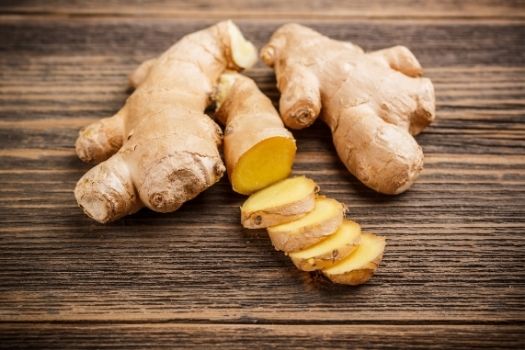
February 08, 2022 3 min read
Ginger is a rhizome that when used for culinary purposes adds an aromatic, pungent, and spicy quality to meals. Its flesh can vary in color from white, yellow, or even red, depending on its variety. The ginger root may have a brownish skin whose thickness will determine if the ginger root was harvested young or mature.
The ginger plant is native to Southeast Asia where it is widely used in its many cuisines such as Indian, Chinese, and other far eastern cuisines. Through the ages, ginger has been prized by these and other civilizations both for its culinary as well as healing properties. From the region of its origin, ginger was gradually imported to other areas of the globe where it now enjoys a worldwide market and is produced in many different parts of the world with almost every region having its own local market.
Medicinal Benefits
 While ginger may be well known for its culinary uses, it is also equally popular for its medicinal properties. Ginger has long enjoyed a coveted spot in traditional medicine for alleviating gastrointestinal problems, having anti-inflammatory potential as well as boosting the immune system among many others.
While ginger may be well known for its culinary uses, it is also equally popular for its medicinal properties. Ginger has long enjoyed a coveted spot in traditional medicine for alleviating gastrointestinal problems, having anti-inflammatory potential as well as boosting the immune system among many others.
Nutritional Profile
While being a negligible source of saturated fat, cholesterol or sodium ginger does offer good supplies of vitamin C, magnesium, potassium and folate along with a host of other antioxidant compounds. Selecting and storing ginger
Ginger is available as fresh ginger root as well as in a dried, powdered form. Choosing the fresh variety over the powdered form offers benefits in terms of superior flavor as well as higher levels of active compounds. When looking for fresh ginger, it is important to make sure that the ginger root is smooth, firm and free of mold. To store fresh ginger, keep it in the refrigerator where unpeeled inger will keep well for up to three weeks. The same may also be stored in the freezer for prolonging its shelf life. Ginger purchased in the powdered form should be stored in a tightly sealed glass container placed in a cool, dry place. It may also be stored in the refrigerator where it will keep well for about a year.
Cooking
Fresh ginger can be used in a variety of ways when added to a dish. After peeling, it may be sliced, julienned or minced completely as per the recipe requirements. The flavor that ginger adds into a dish will depend on the stage at which it is added to the recipe while cooking. So ginger that is added at the start of the cooking process will have an understated flavor when compared to ginger added at the end giving a stronger and more piquant taste. Ginger can be added to many savory dishes to spice them up, brewed into teas or lemonade for
warming and soothing beverages or even be sprinkled onto salads or combined into salad dressings to give them a distinctive flavor. Just as ginger can enhance the taste of savory dishes it may also be used in baked deserts to make them more flavorful.

Thanks for reading this Be Still Farms Blog article. To sign up for more news/articles and/or recipes, click here. For more about us, click here. To shop our certified organic products, click here.
Please comment and share and we look forward to serving you in the future!
Comments will be approved before showing up.

January 27, 2025 3 min read
Flaxseed, the tiny yet powerful superfood, is packed with nutrients that can support weight loss. From curbing hunger to stabilizing blood sugar, this guide dives into the science of how flaxseed can help you shed those extra pounds.

December 11, 2024 3 min read
Discover three quick and easy soup recipes featuring organic small red beans. From a classic vegetable soup to a creamy potato blend, these wholesome recipes are perfect for chilly days and busy weeknights. Packed with flavor and nutrition, these soups will warm your heart and soul this winter!

December 06, 2024 3 min read
This vibrant and nutritious Green Lentil Salad combines tender lentils with grilled chicken, fresh vegetables, and a zesty lemon dressing. Packed with protein, fiber, and essential vitamins, it’s the perfect healthy meal for any time of day.
© 2026 Be Still Farms- Real, Fine Organics.
Privacy | Terms | Refund Policy | Organic Certification
